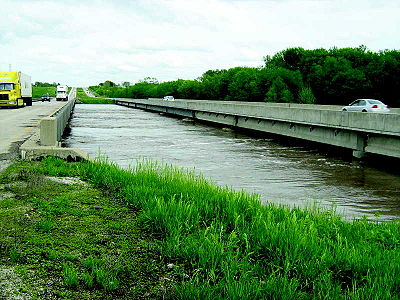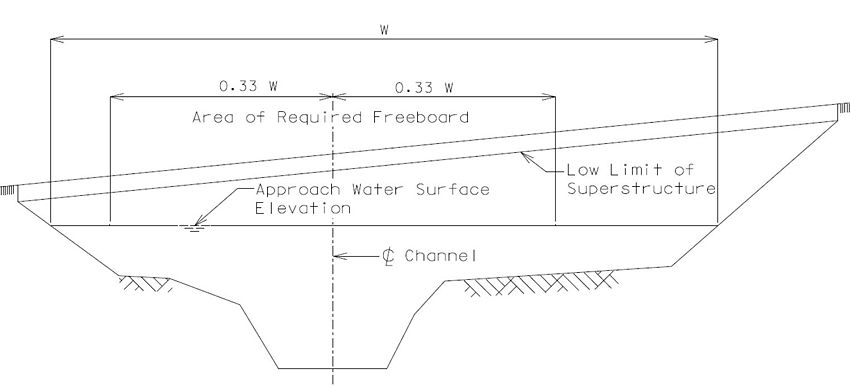748.3 Freeboard: Difference between revisions
m Per Bridge, re-titled and reorganized article for clarity. Provided definitions and guidance to determine limits of freeboard for bridges on steep grades or vertical curve. |
m →748.3.4 Levees: Per Bridge, minor clarification |
||
| Line 29: | Line 29: | ||
==748.3.4 Levees== | ==748.3.4 Levees== | ||
Freeboard for levees is vertical distance from the design water surface elevation to the top of the levee. | Freeboard for levees is the vertical distance from the design water surface elevation to the top of the levee. | ||
FEMA accredited levees must provide a minimum of 3 ft. of freeboard. An additional foot of freeboard is required within 100 ft. of either side of structures (such as bridges) on the riverward side of the levee or whenever the flow is constricted. Levee freeboard should be confirmed as occasionally exceptions to the minimum freeboard requirements are approved by FEMA. | FEMA accredited levees must provide a minimum of 3 ft. of freeboard. An additional foot of freeboard is required within 100 ft. of either side of structures (such as bridges) on the riverward side of the levee or whenever the flow is constricted. Levee freeboard should be confirmed as occasionally exceptions to the minimum freeboard requirements are approved by FEMA. | ||
Latest revision as of 06:26, 23 June 2014

748.3.1 Open Channels
One measure of freeboard in open channels is vertical distance from the design water surface elevation to the top of the channel. Another measure of freeboard in open channels is the vertical distance from the design water surface elevation to the top of the channel lining.
| Minimum Freeboard for Ditches | |
|---|---|
| Roadside Ditches | 1 ft. |
| Ditch Liners | |
| Rock Ditch Liner | 3 in. |
| Paved Ditch Liner | 3 in. |
| Gabion Ditch Liner | 3 in. |
748.3.2 Median Inlets
See EPG 640.2.5 Median Inlet Capacities.
748.3.3 Storm Sewers
748.3.4 Levees
Freeboard for levees is the vertical distance from the design water surface elevation to the top of the levee.
FEMA accredited levees must provide a minimum of 3 ft. of freeboard. An additional foot of freeboard is required within 100 ft. of either side of structures (such as bridges) on the riverward side of the levee or whenever the flow is constricted. Levee freeboard should be confirmed as occasionally exceptions to the minimum freeboard requirements are approved by FEMA.
748.3.5 Bridges and Culverts
Bridge freeboard is the clearance between the lower limit of the bridge superstructure or the bottom of the culvert top slab and the Freeboard High Water surface elevation. An appropriate amount of freeboard allows for the safe passage of ice and debris through the structure (not typically required for culverts). The minimum grade elevation for bridges is obtained by adding minimum freeboard and superstructure depth to the freeboard high water surface elevation.
748.3.5.1 Final Design
Bridge freeboard should be verified during final design. Any change to the freeboard should be noted on the design layout.
748.3.5.2 Design Frequency
Bridge freeboard should be based on a 50-year flood frequency.
748.3.5.3 Minimum Freeboard
| Structure Type | Minimum Freeboard |
|---|---|
| Headwater: | |
| Bridges with Drainage Area ≥ 20 mi2 | 2 ft |
| Bridges with Drainage Area < 20 mi2 | 1 ft |
| Temporary Bridges | 1 ft |
| Culverts | 0 ft |
| Backwater from another stream: | |
| Bridges | 1 ft |
| Culverts | 0.0 ft |
When the drainage area produces unusually large amount of debris, additional freeboard to protect the structure is desirable. If the drainage area produces very little debris a design exception may be used to reduce the minimum freeboard.
748.3.5.4 Limits
For bridges on continuous grade or on a crest vertical curve only a portion of the bridge needs to meet the freeboard requirement. For these bridge types, the area of required freeboard may be taken as shown below.

